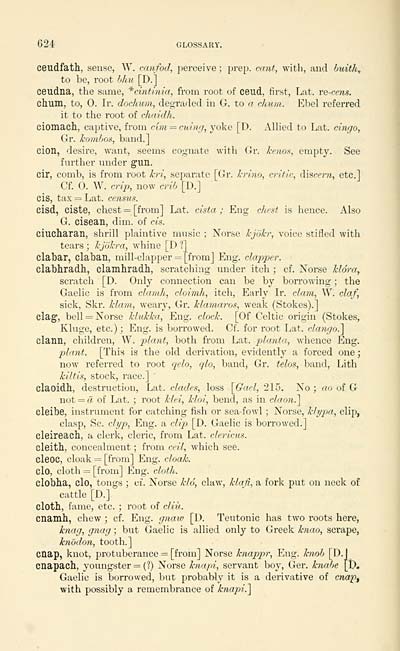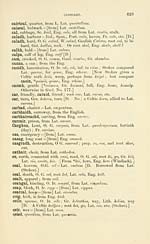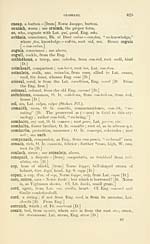Ossian Collection > Reliquiae Celticae > Volume 2
(638)
Download files
Complete book:
Individual page:
Thumbnail gallery: Grid view | List view

624 GLOSSARY.
ceudfath, sense, W. canfod, jjerceive ; prep, cant, with, and huith^
to be, root bhu [D.]
ceudna, the same, *cintmia, from root of ceud, first, Lat. re-cens,
chum, to, 0. Ir. dochum, degraded in G. to a chum. Ebel referred
it to the root of chaidh.
ciomach, captive, from cim = cuhui, yoke [D. Allied to Lat. cingo,
Gr. kombos, band.]
cion, desire, want, seems cognate with Gr. l-oios, empty. See
further under gun.
cir, comb, is from root kri, separate [Gr. kn'no, critic, disceivi, etc.]
Cf. 0. W. crip, now crib [D.]
cis, tax = Lat. census.
cisd, ciste, chest = [from] Lat. cista ; Eng chest is hence. Also
G. cisean, dim. of cis.
ciucharan, shrill plaintive music ; Norse Icjukr, voice stifled with
tears ; /cjulcra, whine [D ?]
clabar, claban, mill-clapper = [from] Eng. clapper.
clabhradh, clamhradh, scratching under itch ; cf. Norse Morciy
scratch [D. Only connection can be by borrowing ; the
Gaelic is from clamh, cloimh, itch. Early Ir. clam, W. claf,
sick, Skr. Mam, weary, Gr. klamaros, weak (Stokes).]
clag, bell = Norse Miikka, Eng. clock. [Of Celtic origin (Stokes,
Kluge, etc.) ; Eng. is borrowed. Cf. for root Lat. clango-l
clann, children, W. plant, both from Lat. planta, whence Eng.
plant. [This is the old derivation, evidently a forced one ;
now referred to root qelo, qlo, bandj Gr. telos, band, Lith
kiltis, stock, race.] "
claoidh, destruction, Lat. clades, loss [Gael, 215. No ; ao of G
not = a of Lat. ; root klei, kloi, bend, as in claon.]
cleibe, instrument for catching fish or sea-fowl ; Norse, klypja, clip,
clasp, Sc. cli/p, Eng. a clip [D. Gaelic is borrowed.]
cleireach, a clerk, cleric, from Lat. clericus.
cleith, concealment ; from ceil, which see.
cleoc, cloak = [from] Eng. cloak.
clo, cloth = [from] Eng. cloth.
clobha, clo, tongs ; CI. Norse klo, claw, klqfi, a fork put on neck of
cattle [D.]
cloth, fame, etc. ; root of cliii.
cnamh, chew ; cf. Eng. gnaw [D. Teutonic has two roots here,
knag, gnag ; but Gaelic is allied only to Greek knao, scrape,
knodon, tooth.]
cnap, knot, protuberance = [from] Norse knappr, Eng. knob [D.J
cnapach, youngster = (?) Norse knapi, servant boy, Ger. knabe [I>.
Gaelic is borrowed, but probably it is a derivative of cnap^
with possibly a remembrance of knapi.^
ceudfath, sense, W. canfod, jjerceive ; prep, cant, with, and huith^
to be, root bhu [D.]
ceudna, the same, *cintmia, from root of ceud, first, Lat. re-cens,
chum, to, 0. Ir. dochum, degraded in G. to a chum. Ebel referred
it to the root of chaidh.
ciomach, captive, from cim = cuhui, yoke [D. Allied to Lat. cingo,
Gr. kombos, band.]
cion, desire, want, seems cognate with Gr. l-oios, empty. See
further under gun.
cir, comb, is from root kri, separate [Gr. kn'no, critic, disceivi, etc.]
Cf. 0. W. crip, now crib [D.]
cis, tax = Lat. census.
cisd, ciste, chest = [from] Lat. cista ; Eng chest is hence. Also
G. cisean, dim. of cis.
ciucharan, shrill plaintive music ; Norse Icjukr, voice stifled with
tears ; /cjulcra, whine [D ?]
clabar, claban, mill-clapper = [from] Eng. clapper.
clabhradh, clamhradh, scratching under itch ; cf. Norse Morciy
scratch [D. Only connection can be by borrowing ; the
Gaelic is from clamh, cloimh, itch. Early Ir. clam, W. claf,
sick, Skr. Mam, weary, Gr. klamaros, weak (Stokes).]
clag, bell = Norse Miikka, Eng. clock. [Of Celtic origin (Stokes,
Kluge, etc.) ; Eng. is borrowed. Cf. for root Lat. clango-l
clann, children, W. plant, both from Lat. planta, whence Eng.
plant. [This is the old derivation, evidently a forced one ;
now referred to root qelo, qlo, bandj Gr. telos, band, Lith
kiltis, stock, race.] "
claoidh, destruction, Lat. clades, loss [Gael, 215. No ; ao of G
not = a of Lat. ; root klei, kloi, bend, as in claon.]
cleibe, instrument for catching fish or sea-fowl ; Norse, klypja, clip,
clasp, Sc. cli/p, Eng. a clip [D. Gaelic is borrowed.]
cleireach, a clerk, cleric, from Lat. clericus.
cleith, concealment ; from ceil, which see.
cleoc, cloak = [from] Eng. cloak.
clo, cloth = [from] Eng. cloth.
clobha, clo, tongs ; CI. Norse klo, claw, klqfi, a fork put on neck of
cattle [D.]
cloth, fame, etc. ; root of cliii.
cnamh, chew ; cf. Eng. gnaw [D. Teutonic has two roots here,
knag, gnag ; but Gaelic is allied only to Greek knao, scrape,
knodon, tooth.]
cnap, knot, protuberance = [from] Norse knappr, Eng. knob [D.J
cnapach, youngster = (?) Norse knapi, servant boy, Ger. knabe [I>.
Gaelic is borrowed, but probably it is a derivative of cnap^
with possibly a remembrance of knapi.^
Set display mode to: Large image | Transcription
Images and transcriptions on this page, including medium image downloads, may be used under the Creative Commons Attribution 4.0 International Licence unless otherwise stated. ![]()
| Early Gaelic Book Collections > Ossian Collection > Reliquiae Celticae > Volume 2 > (638) |
|---|
| Permanent URL | https://digital.nls.uk/81694442 |
|---|
| Description | Vol. II. |
|---|---|
| Shelfmark | Oss.288 |
| Attribution and copyright: |
|
| Description | Selected books from the Ossian Collection of 327 volumes, originally assembled by J. Norman Methven of Perth. Different editions and translations of James MacPherson's epic poem 'Ossian', some with a map of the 'Kingdom of Connor'. Also secondary material relating to Ossianic poetry and the Ossian controversy. |
|---|
| Description | Selected items from five 'Special and Named Printed Collections'. Includes books in Gaelic and other Celtic languages, works about the Gaels, their languages, literature, culture and history. |
|---|

